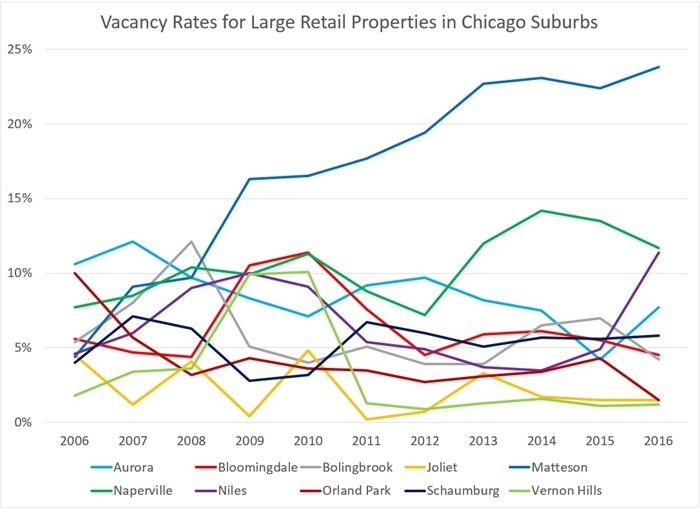
Flickr user vxla (CC)
River Oaks Shopping Center is one of eight large retail properties in Calumet City, Ill.
Some believe Black Friday, considered to be the busiest shopping day of the year, got its name because it was the day, more than any other during the year, when retailers could count on turning a profit—known as being “in the black.”
However, the label could be a bit of a misnomer in the Chicago region where shopping hubs in majority-black suburbs have been anything but “in the black” in recent years. In fact, large retail outlets in majority-black suburbs have struggled far more often than others in the region, according to a Metropolitan Planning Council (MPC) analysis of retail market data from CoStar, a provider of commercial real estate property data.
MPC analyzed CoStar data for more than 800 retail properties of 100,000 square feet or more in the Chicago region, including Cook, DuPage, Kane, Kendall, Lake, McHenry and Will counties. For the region, the vacancy rate was 6.6 percent for such properties as of the third quarter of 2016.
However, the vacancy rate was more than three times that amount in the majority-black suburbs of Matteson and Calumet City—the only majority-black suburbs in the region that are home to regional malls and at least eight of the large retail properties included in MPC’s analysis.
In Calumet City, home to the River Oaks Shopping Center, the third-quarter 2016 vacancy rate for retail properties of at least 100,000 square feet was 24.2 percent. That figure has risen sharply since 2006 when it was under 2 percent. In that time, River Oaks lost one of its three anchor stores when Sears closed in 2013, and a nearby Calumet City Target store closed in 2015.
In Matteson, home of Lincoln Mall, the vacancy rate for large retail properties was 23.8 percent as of the end of Q3 in 2016—also a steep climb from its 2006 mark of 4.4 percent. In the 10 years since that time, Matteson also lost a Sears, a Target and a Wal-Mart. Lincoln Mall itself closed in early 2015.

Data from CoStar
The fate of large retail outlets in Matteson, Calumet City and other majority-black communities are of interest to MPC as a part of our Cost of Segregation project. Economic development is vital to communities of color as a much-needed source for jobs and revenue and as a stabilizing force against the blight and disinvestment that has plagued those communities in the Chicago region for decades.
MPC is exploring what role racial and economic segregation may play in the economic health of communities of color. Understanding what draws investment to those communities as well as what lures it away may be key to establishing strong economic development policies for those areas.
This #GivingTuesday, support MPC's work for a stronger Chicagoland. >>